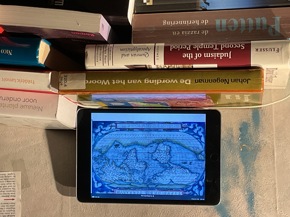34931Y195 That's true to some extent, but it .....
Q&@
IGNORES AN
OPPOSITE HISTORICAL DYNAMIC?
As bureaucracies accumulate power
they become immune to their own mistakes!
Instead of changing their stories to fit reality,
they can change reality to fit their stories: in the end
external reality matches their bureaucratic fantasies, but only
because they forced reality to do so?! For example, the borders
of many African countries disregard river lines, mountain ranges & trade routes,
split historical & economic zones unnecessarily, and ignore local ethnic & religious identities!?
The same tribe may find itself riven among several countries, whereas one country may incorporate
splinters of numerous rival clans. Such problems bedevil countries all over the world, but in Africa
they are particularly acute because modem African borders don't reflect the wishes & struggles of
local nations. They were drawn by European bureaucrats who never ever set foot in Africa.
In the late 19th century several European powers laid claim to African territories? Fearing
that conflicting claims might lead to an all-out European war, the concerned parties got together
in Berlin in 1884 and divided Africa as if it were a pie! Back then much of the African interior still
was terra incognita to Europeans. The British, French & Germans had accurate maps of Africa's
coastal regions, & knew precisely where the Niger, Congo & Zambezi empty into the ocean.
However, they knew little about the course these rivers took inland, about the kingdoms
& tribes that lived along their banks, & about local religion, history & geography,
for this hardly mattered to the European diplomats.
They unrolled a half-empty map of Africa
óver a wèll-pòlished Berlin table,
sketched a few lines here &
there, and divided the
continent among
them.
IGNORES AN
OPPOSITE HISTORICAL DYNAMIC?
As bureaucracies accumulate power
they become immune to their own mistakes!
Instead of changing their stories to fit reality,
they can change reality to fit their stories: in the end
external reality matches their bureaucratic fantasies, but only
because they forced reality to do so?! For example, the borders
of many African countries disregard river lines, mountain ranges & trade routes,
split historical & economic zones unnecessarily, and ignore local ethnic & religious identities!?
The same tribe may find itself riven among several countries, whereas one country may incorporate
splinters of numerous rival clans. Such problems bedevil countries all over the world, but in Africa
they are particularly acute because modem African borders don't reflect the wishes & struggles of
local nations. They were drawn by European bureaucrats who never ever set foot in Africa.
In the late 19th century several European powers laid claim to African territories? Fearing
that conflicting claims might lead to an all-out European war, the concerned parties got together
in Berlin in 1884 and divided Africa as if it were a pie! Back then much of the African interior still
was terra incognita to Europeans. The British, French & Germans had accurate maps of Africa's
coastal regions, & knew precisely where the Niger, Congo & Zambezi empty into the ocean.
However, they knew little about the course these rivers took inland, about the kingdoms
& tribes that lived along their banks, & about local religion, history & geography,
for this hardly mattered to the European diplomats.
They unrolled a half-empty map of Africa
óver a wèll-pòlished Berlin table,
sketched a few lines here &
there, and divided the
continent among
them.
23 jun 2019 - bewerkt op 27 jun 2019
- meld ongepast verhaal
Log in om een reactie te plaatsen.
- O 23 mrt 2024 47321 Elke gastvrijheid die hen in een nieuwe stad
- O 23 mrt 2024 47320241Dat wònder v/d broden & vissen gaf ook aan
- O 23 mrt 2024 47319 De leerlingen worden samen eropuit gezonden
- O 23 mrt 2024 47318 ‘t Wònder v/d broden en vissen werd door de
- O 23 mrt 2024 47317240Luc 7:22-23 vertelt hoe Yèsj o/d vráág van
- O 22 mrt 2024 47316238De dood van Yochanan de Doper @ Machaerus
- O 22 mrt 2024 47315 ‘t Gebruik van gelijkenissen: Yèsj maakt dus
- O 22 mrt 2024 47314 ‘Je kunt niet G d díenen & de mammon!’ zéi
- O 21 mrt 2024 47313237In geen geval was ‘t toegestaan om prat te
- O 21 mrt 2024 47312236De uitspraken van Yèsj dwongen hen die hèm
- O 21 mrt 2024 47311235 Zoals MAT ze weergeeft kunnen deze zalig-
- O 21 mrt 2024 47310 Éérst zijn er de ‘zaligsprekingen’, de korte
- O 21 mrt 2024 47309 Yèsj zètte z’n werk voort & onderbrak ‘t nog
- O 20 mrt 2024 47308 In de verhalen komt Miryam bijna niet voor!?
- O 20 mrt 2024 47307 De Belastinginner Tolambtenaar Mattheüs kwam
